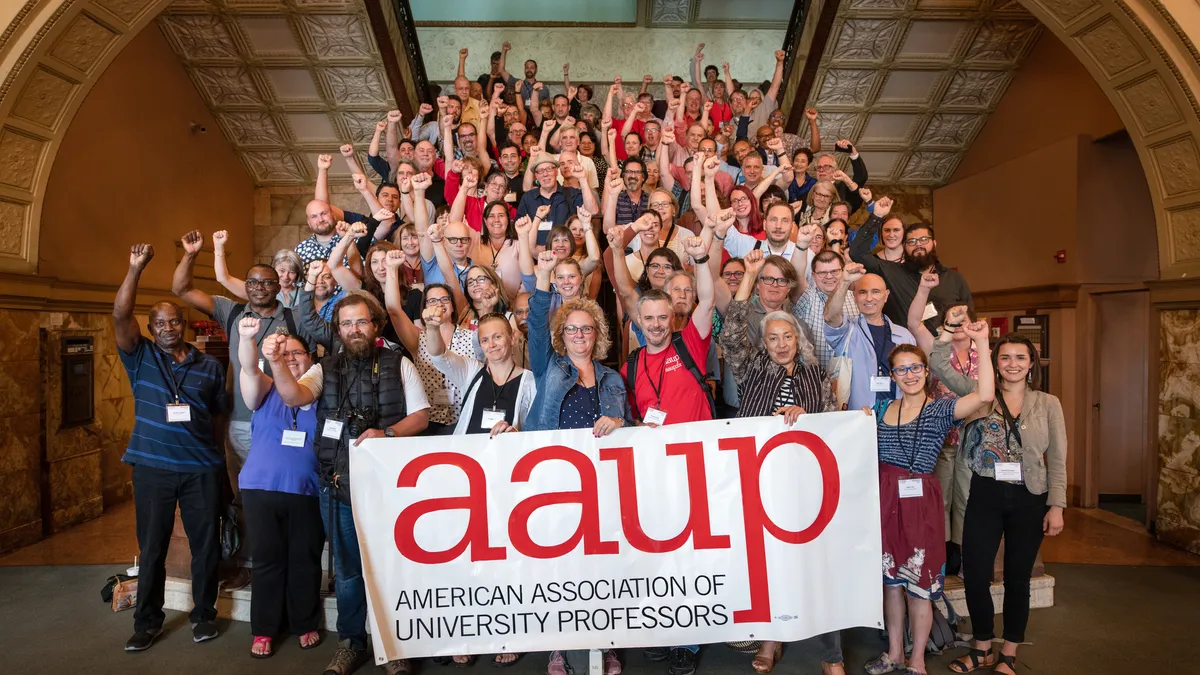Dive Brief:
- The American Association of University Professors and the American Federation of Teachers have come to a tentative agreement to expand a partnership between the two groups. The goal is to advocate for faculty and their rights to collective bargaining and academic freedom.
- Under the proposed affiliation agreement, members of the AAUP, which is a nonprofit membership association with some chapters that collectively bargain, will also be members of the AFT, a major union representing educators, government employees and healthcare professionals. AAUP collective bargaining chapters will become chartered locals of the AFT, according to an email sent to AAUP members Monday. Members of AAUP's non-collective bargaining chapters will become part of a nationwide AAUP-AFT local.
- AAUP's governing council unanimously recommended holding a ratifying vote during the organization's delegate convention in June. Another vote at an AFT meeting would follow in July. If both pass, the agreement would go into effect Aug. 1.
Dive Insight:
For over 10 years, the AAUP has maintained a joint organizing agreement with the AFT. The contract has come up for renewal every three years.
"The AFT approached us about a year ago and they talked about enhancing the partnership, instead of just renewing," said Irene Mulvey, president of AAUP.
Since August, both groups have worked with legal experts and auditors to develop a stronger framework for collaboration. The resulting agreement would allow for the sharing of resources, without diluting either faction's brand, according to Mulvey.
"We completely maintain everything about our organizational structure, our autonomy and our independence," Mulvey said. "This is what both organizations wanted."
The partnership's goal is, as always, to advocate for faculty and their right to collective bargaining, said Mulvey.
"We have this long history of advancing shared governance. The AFT has resources and reach," she said. "The organizational strengths of AFT will allow us to start organizing at community colleges and with graduate students even in right-to-work states."
Right-to-work states prohibit companies and unions from signing a contract that requires workers to pay dues or fees.
Mulvey said she received positive feedback from groups in several states, like Kansas, Nebraska and Colorado, on the prospect of organizing faculty even when collective bargaining is not available.
Faculty issues and labor relations have been under the microscope across the country as colleges face financial pressures that often lead to faculty cuts, graduate students organize to seek higher wages and college leaders attempt to navigate a charged partisan climate where lawmakers have been trying to wade into day-to-day operations and the classroom.
For example, the AAUP fought a bill that would have ended tenure in South Carolina's public colleges that stalled this year. The bill's sponsor, a Republican, has said he will reintroduce it next year. In Texas, Lt. Gov. Dan Patrick pledged to end tenure at public colleges after faculty members at the University of Texas at Austin publicly stated that instructors should control classroom topics and be able to teach race-related topics like critical race theory.
Combining resources will allow the AAUP and the AFT to fight back against infringements on academic rights, Mulvey said.
"We're pushing back on that as hard as we can," she said. "This agreement would allow us to protect freedom in academia and make the academic labor movement more powerful."
The AAUP has around 44,000 members. The AFT's higher education membership is around 240,000, as of February.
More than 20,000 faculty and other academic workers are in unions jointly represented by the AAUP and the AFT. Leaders don't anticipate dues changing because of this agreement, according to Mulvey. The AFT charge per union member will be covered as part of AAUP membership dues.
The arrangement will allow the AFT to work on behalf of academic workers ranging from adjunct teachers to tenured professors, according to its president, Randi Weingarten.
"The AFT and AAUP are coming together to unleash the purpose, promise and possibilities of higher education in America," Weingarten said in a statement. "The idea of the university is to encourage and defend the free exchange of intellectual labor because all scholarship and teaching create value — whether it is social, economic or cultural."
Mulvey is optimistic the agreement will pass both organization's voting bodies.
"What I'm hearing from members and chapters is real excitement about the potential for this to give faculty an enhanced voice in the profession and in our institutions," Mulvey said. "It could help higher education to play its vital role in sustaining democracy in our country."














